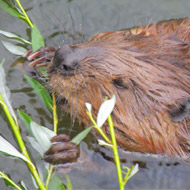
Welsh Beaver Project to submit application
Wildlife experts are investigating the possibility of reintroducing wild beavers to Wales, centuries since they were last seen in the country.
The Welsh Beaver Project says that the proposal is being led by The Wildlife Trusts in Wales as part of their Living Landscapes programme.
The team plan to put forward a licence application to free 10 beavers in the south of Wales, hoping to begin the reintroduction later this year.
In November, the Scottish Government gave the Scottish Beaver Trial the go-ahead to reinforce the existing beaver population in Knapdalr, Argyll. The mammal will now be recognised as a native species in Scotland, 400 years after being hunted to extinction in the UK.
Speaking to Wales Online, staff at Wildlife Trusts Wales said that following the re-submission of the application - first made over a year ago - to Natural Resources Wales, there would be a public consultation.
"The evidence coming from Britain and Europe is they can be beneficial for ecology, helping with reducing flooding and filtering water, and have important consequences for the landscape,” commented Alicia Leow-Dyke, Welsh beaver project officer for the Wildlife Trusts Wales.
She added that the beavers may help with habitat restoration, bringing light into overgrown areas and allowing other nature to thrive.
"With the beaver you're not looking at a single species, it can have such a wider benefit helping the ecosystem. Because we've had such a detrimental effect on the landscape for so long, this can help," she said.



 The Veterinary Medicines Directorate (VMD) is inviting applications from veterinary students to attend a one-week extramural studies (EMS) placement in July 2026.
The Veterinary Medicines Directorate (VMD) is inviting applications from veterinary students to attend a one-week extramural studies (EMS) placement in July 2026.